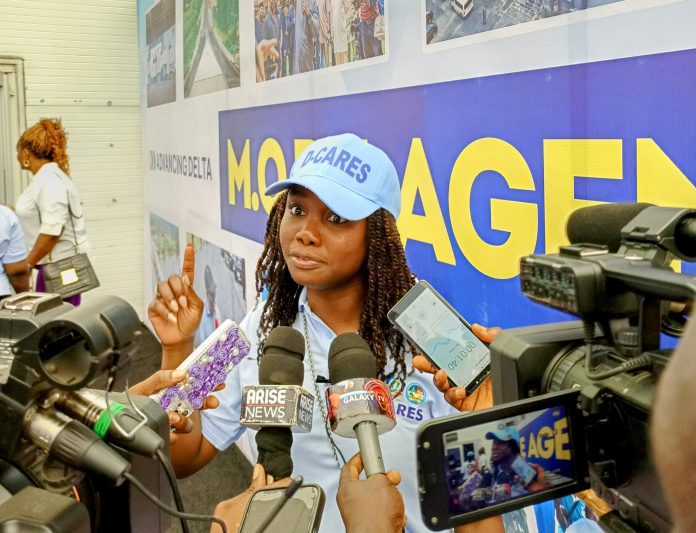Asaba, September 17, 2024 – The Delta State Commissioner for Girl Child Entrepreneurship and Humanitarian Support Services, Orode Uduaghan, reaffirmed the state’s commitment to expanding the Delta State Community Action for Resilience and Economic Stimulus (D-CARES) program during the official flag-off event at the Dome Event Center, Asaba. This year, the initiative saw an impressive 97,365 individuals benefit from its financial and resource support, highlighting the government’s focus on uplifting vulnerable communities.
“Today, we are flagging off the 4th phase of the D-CARES program that the state has been running for the past few years,” Uduaghan remarked at the launch. “This time, we are adding more beneficiaries and scaling up the program to reach more people. It’s a positive step forward as the number of beneficiaries continues to grow.”
Uduaghan underscored the far-reaching impact of D-CARES, particularly in communities where funding is being allocated to essential services. “Communities that are receiving funds will use them to rehabilitate school structures, hospitals, and borehole water systems,” she said, pointing out that these improvements will directly benefit local populations and increase access to essential infrastructure.
In addition to community infrastructure projects, the program continues to support individuals with stipends, focusing on the most vulnerable populations. “Even though the stipends may be small, they go a long way in supporting those who need it most,” Uduaghan said, particularly mentioning the chronically ill, elderly, and bedridden individuals.
The Commissioner also highlighted the program’s contribution to the agricultural sector. By providing critical inputs to farmers, the D-CARES program has enabled them to reinvest in their farms and boost production. “This time, we are supporting 97,365 people. That is a huge number, and it’s a really good development,” Uduaghan added.
Uduaghan extended heartfelt gratitude to Delta State Governor Rt. Hon. Sheriff Oborevwori, the federal government, and the World Bank for their unwavering support of the NG-CARES initiative. “I appreciate the Governor, the federal government, and the World Bank for this program. It’s a very good initiative,” she said, stressing the importance of collaborative efforts in ensuring the success of D-CARES.
The Commissioner advised beneficiaries to make wise use of the starter packs and resources provided through the initiative. “The beneficiaries should use what they’ve been given wisely. We don’t want a situation where they go and sell their starter packs for immediate gain. It’s better to invest the resources in their businesses to create a steady income stream,” she cautioned, encouraging recipients to focus on long-term sustainability.
When questioned about the program’s oversight mechanisms, Uduaghan assured the public that strict monitoring and evaluation systems are in place to ensure proper utilization of the funds and resources. “This is a World Bank program in collaboration with Delta State, and we adhere to the standards set by the World Bank. For us to be doing this for the 4th time means we are doing something right,” she stated confidently.
Uduaghan also emphasized the involvement of multiple ministries and agencies in overseeing the program’s implementation, including the Ministry of Humanitarian Services, Economic Planning, Agriculture, Youths, Women Affairs, and DESMA, as well as the Job Creation Bureau. “We have a strong state steering committee comprising six different ministries and agencies, ensuring accountability and transparency,” she concluded.
As the D-CARES program continues to roll out its 4th phase, it remains a critical support system for Delta State’s most vulnerable populations. The program, aimed at fostering economic empowerment and resilience, is making tangible impacts on individuals, families, and communities, contributing to the state’s broader goal of sustainable development.
The Delta State Community Action for Resilience and Economic Stimulus (D-CARES) program continues to be a transformative force, ensuring that economic relief reaches those who need it most.



